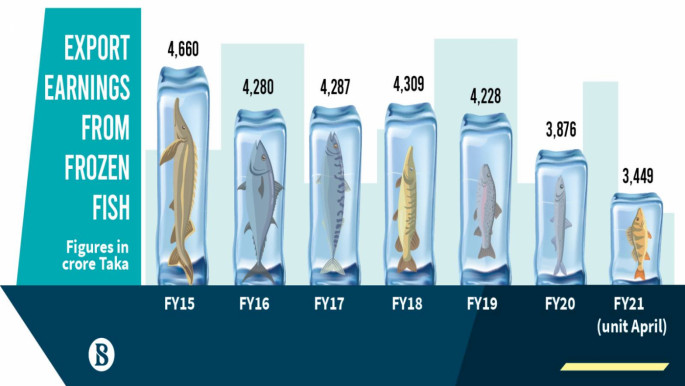
Fish exporters are at risk as market shrinks

Meenhar Sea Foods Ltd in Chattogram, which pioneered fish export from the erstwhile East Pakistan (now Bangladesh), is on the brink of shutting down its business.
Once a thriving organisation, it has another fish processing unit in Cox's Bazar. Recently, the frozen fish export sector that has been polluted by amateur entrepreneurs, according to businessmen, started facing fresh challenges in the throes of the pandemic: the demand plummeted and the main export market in Saudi Arabia closed.
Meenhar started counting losses putting at risk Tk100 crore investment from the Agrabad branch of One Bank in Chattogram. Its payment against the bank loan became irregular in 2019 following a drop in export, said the branch manager.
Meenhar's two factories have closed already. Not only Meenhar, many other fish exporters have already become defaulters, which are failing to repay nearly Tk400 crore in total.
Of the loans, Coastal Seafood and Kuliarchar Sea foods took out Tk73 crore and Tk65 crore from state-run Sonali Bank and Meghna Seafood Tk59 crore from Bangladesh Krishi Bank. Moreover, Sonali Bank is struggling to recover a big amount given in loan to Sea Foods Corporation (Chandpur).
According to Bangladesh Frozen Food Association, there were nearly 140 fish exporters in the country, of which 50 have closed permanently. Only 30 organisations are exporting frozen fish now, it said.
Chattogram Sagorika BSCIC industrial zone and Kaluaghat BSCIC industrial zone had around 75 fish exporters five years ago. Before the Covid outbreak, the figure dwindled to 44. Of the organisations, only 5-6 are still operational in a risky business environment.
Over the last five years, export earnings of the sector have gone down, said the association. The income declined by around Tk400 crore to Tk3,449 crore last fiscal year from the previous year. In FY2014-2015, the sector earned Tk4,660 crore from exports.
Ashraf Hossain Masud, co-president of Bangladesh Frozen Foods Export Association, said Covid had devastated the sector. In recent times, it lost 75% of its export market due to lockdowns forcing hotels, restaurants and the tourism industries to remain shut around the world.
"Our main buyer, Saudi Arab has stopped importing fish from us. Moreover, aquatic fish population shrank in the sea, resulting in reduced production of Bagda shrimp."
To keep the sector afloat, Bangladesh has to negotiate reopening of the Saudi Arabian market immediately, Ashraf said, adding that the government should help turn around the sector.
Shahajan Chowdhury, managing director of Riverine Fish and Food Processing Industries Limited, said fish production was low, compared to the number of organisations involved in the export business.
"The production came down year after year. On the other hand, shrimp from Vietnam captured the export markets of the European Union, the USA, China, Japan and Russia."
Several entrepreneurs said the sector flourished in the 80s and business had been good until 2004-2005. After that new people joined in just for a hobby while others took out bank loans on the pretext of doing fish processing business and ended up buying lands and flats to lead a luxurious life.
The decline in fish production has led to an unhealthy competition among businesses in buying fish, which reduced the profit margin. As a result, real businessmen started counting losses.
Editor & Publisher: S. M. Mesbah Uddin
Published by the Editor from House-45,
Road-3, Section-12, Pallabi, Mirpur
Dhaka-1216, Bangladesh
Call: +01713180024 & 0167 538 3357
News & Commercial Office :
Phone: 096 9612 7234 & 096 1175 5298
e-mail: [email protected]
HAC & Marketing (Advertisement)
Call: 01616 521 297
e-mail: [email protected]